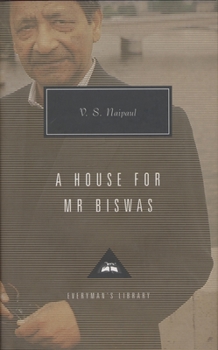A House for Mr. Biswas: Introduction by Karl Miller
Select Format
Select Condition 
Book Overview
From the Nobel Prize-winning author comes a tragicomic masterpiece of social manners in a postcolonial society--and "arguably Mr. Naipaul's finest novel" (The New York Times). - The book that turned the gentle satirist of the Caribbean into a major literary figure, in a hardcover edition with an introduction by Karl Miller.
His birth ill-omened, his life dominated by fitful, comic struggles and resentful truces with those to whom he is obligated, Mr. Mohun Biswas of Trinidad, toward the end of his forty-sixth year on earth, triumphantly purchases his own house and becomes his own man. Around this supremely simple story, V. S. Naipaul builds one of the few virtually perfect novels in our language, a book that is--in the balance struck between its small incidents and its large, overarching patterns, in the ironic beauty of its prose--at once compelling, mysterious, and classical. It is also one of the few novels in any language that transcend their own genre. By the end of A House for Mr. Biswas we are reading a tremendous parable about the individual self in its enslavement to time and change, and in its search for freedom.
His birth ill-omened, his life dominated by fitful, comic struggles and resentful truces with those to whom he is obligated, Mr. Mohun Biswas of Trinidad, toward the end of his forty-sixth year on earth, triumphantly purchases his own house and becomes his own man. Around this supremely simple story, V. S. Naipaul builds one of the few virtually perfect novels in our language, a book that is--in the balance struck between its small incidents and its large, overarching patterns, in the ironic beauty of its prose--at once compelling, mysterious, and classical. It is also one of the few novels in any language that transcend their own genre. By the end of A House for Mr. Biswas we are reading a tremendous parable about the individual self in its enslavement to time and change, and in its search for freedom.
Format:Hardcover
Language:English
ISBN:0679444580
ISBN13:9780679444589
Release Date:November 1995
Publisher:Everyman's Library
Length:508 Pages
Weight:1.40 lbs.
Dimensions:1.3" x 5.4" x 8.2"
Customer Reviews
5 ratings
A classic from last years Nobel winner.
Published by Thriftbooks.com User , 22 years ago
This is one of the handful of true classics written since the Second World War, and the greatest novel ever written by someone who lived and grew up in the Third World. It is a story told with great compassion and humor of Mohun Biswas, a man who, despite all his faults and weaknesses, is head and shoulders above his provincial but wealthy in-laws. The novel chronicles Mr. Biswas's sad but dogged struggle to attain a level of dignity among people sunk in stupidity and a mania for status. Reading this book, I began to understand Naipaul's especially pessimistic non-ideological conservatism. He sees all too clearly how the problems of the Third World are a product of certain type of congenital dysfunction. This is the tragedy of the novel. The people he describes are victims of their own states of mind. Any attempt to "liberate" them would surely fail, because you cannot cure sicknesses of the soul. Biswas realizes he can do nothing about his in-laws. They are hopeless cases. When they move to a country state, instead of harvesting the many orange trees on the property, they begin chopping them down so they can pick the oranges that much easier. By this time, Biswas is too much of a fatalist even to be angry about this any more. In Biswas fatalism we see the seeds of Naipaul's pessimistic vision of the Third World.
A struggle for independence
Published by Thriftbooks.com User , 22 years ago
As a British colony, Trinidad became the home of many Indian immigrants, and "A House for Mr. Biswas" tells the story of a man who is born into and grows up in this society searching for a place he can call his own. In this novel, V.S. Naipaul vividly and picturesquely describes Trinidad as a thriving but generally poor island populated by a strong Hindu community with a waning observance of the caste system and where, even well into the twentieth century, the most common mode of transportation is the bicycle.Naipaul's titular protagonist, Mohun Biswas, was born a bad omen, declared by a pundit (Hindu scholar) to be the eventual downfall of his parents; the prophecy is seemingly fulfilled when his father accidentally dies because of his mischief. After some brief schooling, Mr. Biswas (as he is called throughout the novel, even as a young boy) embarks on a series of odd jobs: After an unsuccessful apprenticeship to a pundit, he is sent to work in a relative's rumshop and later becomes a sign-painter. It is on this job that he meets a pretty girl named Shama, whose family, named Tulsi, owns many properties and businesses in Trinidad. A marriage is arranged between Biswas and Shama, and he soon finds himself a prisoner of the Tulsi family in a way, a situation which becomes the basis for his lifelong struggle for independence. The Tulsis' house, called the Hanuman House, is crowded with members of Shama's extended family, including her mother, her uncle Seth, who manages much of the family's businesses, brothers, sisters, and innumerable and indistinguishable nieces and nephews -- living conditions which lead to irritation and violent arguments with in-laws. The Tulsis give him a shop to run and a sugarcane field to oversee, but he lets deadbeats and workers take advantage of him. His attempt to build his own house and move away from the Tulsis for good, with the help of an incompetent carpenter, ends in disaster. On his own initiative, he becomes a reporter for a Trinidad newspaper, the Sentinel, writing sensational and often embellished stories, interviewing "Deserving Destitutes," and learning a new kind of creativity which grants him true vocational freedom from the Tulsis. Meanwhile, Shama bears him four children, among whom there is only one son, Anand, whose fragile relationship with his father instills the novel with touching moments of realism. It's easy to empathize with Mr. Biswas, for he is a character of the most universal sort -- everyone can relate to his desire for autonomy, freedom, and independence. He could be a symbol of the emancipation of a controlled people -- specifically, Indian independence from the British empire -- but the novel also succeeds on its surface level. We know from the prologue that Mr. Biswas eventually does escape the Tulsis and obtain a house, a decrepit, boxlike affair that hardly seems like a personal triumph. But it is *his* house, his declaration of independence, a final confirmation that
A Nobel Prize for Mr. V.S. ( Naipaul, that is)!!
Published by Thriftbooks.com User , 23 years ago
?A House for Mr. Biswas? is all of the following -- complex, psychologically perceptive, emotionally difficult, rewarding, moving, depressing, tragi-comic, deeply ironic, metaphoric, nightmarishly surreal, utterly believable, honest, exasperating, claustrophobic, prudish in some ways (no sex, for instance), deeply human, liberating, brilliant, frustrating, beautifully written ? and much more. It is a book which very well may tempt you, as it tempted me, to just say ?the hell with it? about halfway through, as Mr. Biswas struggles, but never seems able to achieve, autonomy, self respect, happiness, freedom (especially from the suffocating, sprawling Tulsi family ? the ultimate in-laws from hell!!), let alone the ?house? referred to in the title. But don?t give in to temptation! ?A House for Mr. Biswas? is a book that richly rewards those who stick with it, who persevere, just as Mr. Biswas does, although at times you may feel like you can?t take it anymore (one step forwards, two steps back, argggghhh!). Perhaps a helpful attitude in reading this book, which I strongly recommend you consider, is to think of yourself as a ?reader and learner? (to use V.S. Naipaul?s term for the Tulsi schoolchildren) at the feet of a superb writer with something to say and a great deal of wisdom to impart.In sum, ?A House for Mr. Biswas? is a deeply satisfying (as opposed to ?entertaining? or superficially ?enjoyable?) book, NOT easy summer ?beach reading?, but a book which confirms the psychological cliché that it?s the HARD STUFF which is potentially the most rewarding emotionally. So, don?t let the fact ?A House for Mr. Biswas? is not ?easy? scare you off, because this is truly a brilliant book, and one which richly deserves its ranking as one of the ?best books of the century? (#72 on the Modern Library?s best fiction list, for instance). Oh, and by the way, why hasn?t V.S. Naipaul won the Nobel prize for literature yet? (Earth to Nobel Prize committee, come in please!) Anyway, for what it?s worth, I hereby nominate him, and hope that many of you will second my nomination!
an epic: sad, funny, rambling.
Published by Thriftbooks.com User , 23 years ago
in a way, the tone of this book is slightly familiar: a tale of one man, from childhood to death, in trinidad. Mohun Biswas seems cursed from birth, and after his father dies we trace him as he tries his hand at various trades and occupations before he marries into the tight-knit and tyrannical Tulsi family. Mr Biswas is a struggler, and he alienates almost everyone as he gives voice to his considerable, though at times intractible and immature, mind. but the primary lesson in this book is that *time passes.* and things evolve. after an exhausting chain of negative events that bring the reader to the point of putting the book down -- "this is too depressing!" things start to turn out a bit better. not spectacularly -- just the kind of improvements that come from *growing older.* only in the final third of the book do you start to realize -- hey, I've been reading one of the best books I've ever read. This was an incredible journey, and I'm wiser about lives and souls under colonialism, wiser about how we age and struggle and grow, and wiser about how like deals two bad blows for each good development, and still life could be called good. a truly great book.
A beautiful novel
Published by Thriftbooks.com User , 25 years ago
Like most of the other reviewers, I was captivated by Naipaul's obvious mastery of the language. This book is worth reading for that alone. But it also worth reading for the beauty of the story. It is a simple story: a man is born into a world devoid of opportunity; he feels himself belittled by that world, trapped in a role that makes him merely an appendage in other people's lives; against the odds and all expectations, he carves out a place for himself, a home, where he can be his own man and the leading actor of his own life. While it is true that the character Mohun Biswas is not entirely sympathetic -- indeed he is often exasperating and occasionally contemptible -- I felt I understood why he acted as he did, and could empathize. This is a testimony to the power of Naipaul's artistry; he has, in tracing Biswas from birth to death, created a fully developed human being, as perfect a simulcram of a real person as exists in modern literature. Being able to understand, and share in, the life journey of such a character is a powerful experience.
A House for Mr. Biswas Mentions in Our Blog

Reading Challenge: Reading About Different Cultures
Published by Bianca Smith • March 08, 2018
Living different lives, in the pages of books.






